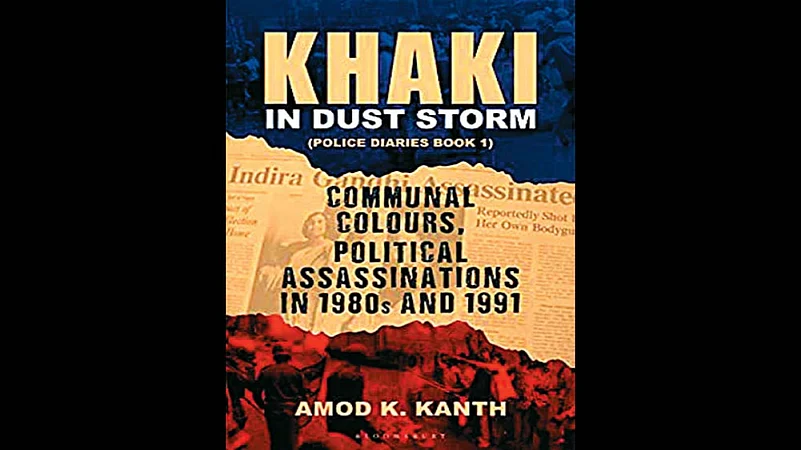The 1980s and the early ’90s have arguably been the most tumultuous years in India’s modern history. The decade started with Punjab being engulfed by violence, largely fired by radical preacher Jarnail Singh Bhindranwale, who had ensconced himself in the Golden Temple complex with heavily armed followers. In 1984, then prime minister Indira Gandhi ordered Operation Bluestar to flush them out, triggering a cataclysmic chain of events, starting with her assassination, the horrific riots in its wake, the killing of Lalit Maken, Arjun Das and Gen A.S. Vaidya. The next decade started with the assassination of Rajiv Gandhi in 1991 by the LTTE for sending the Indian Peace Keeping Force to Sri Lanka.
Maintaining meticulous records of these events and the immersive investigations that followed was a young police officer, Amod Kanth, who found himself at the vortex of it all. The IPS officer has now dug into his aide-memoire and written a forthright account, highlighting how political manipulations and terrorism fed on each other, consuming the socio-political structure of the day, leading to his own cathartic evolution and continuing contribution to civil society.
Khaki in Dust Storm—the first of his series of ‘police diaries’—is subtitled ‘Communal Colours and Political Assassinations (1980-91). In this evenhanded autobiographical account, Kanth writes about the shortcomings of the criminal justice system, the nexus between politicians and anti-social elements and the pressure on law enforcement agencies to influence investigations, especially in high-profile cases.
Without sensationalising events, Kanth has touched upon controversial issues with sensitivity. Ever since Mrs Gandhi’s assassination, there was believed to be an unwritten code among security/intelligence agencies not to deploy Sikhs in sensitive positions. Though Kanth denies knowledge of any such unwritten law, he does mention an order that was issued by then Commissioner of Police (CP) Subhash Tandon to disarm Sikh police personnel.
Talking about events on November 1, 1984—the day after Mrs Gandhi was assassinated, Kanth writes, “Earlier in the day, a grave mistake had been committed. A wireless message was sent by the police headquarters to disarm all Sikh police officers. The purpose was to keep them away from the crowds and from coming into public contact…. such a move had an extremely demoralising effect on them.” Kanth, then the DCP of Central district, says he requested the CP to cancel the order. Even as the order was cancelled, “the damage had already been done. The Sikh officers were bitter about their professionalism being questioned”.
Political developments also led to Rajiv Gandhi’s assassination in 1991. Kanth, then on deputation to the CBI, found himself part of the team that was investigating Rajiv’s assassination. Digging into his papers, Kanth has come out with many facts made public for the first time. “With regard to Rajiv Gandhi’s decision to get deeper into the Sri Lankan imbroglio…it appears to us that many a times, even heads of governments take steps whose ramifications are very different from what they anticipate,” writes Kanth.
He also details the investigations into the ‘transistor bombs’ in 1985—another fallout of Sikh militancy—that had Delhi, Haryana and UP on the edge, and deals with his experience in the Delhi Police Crime Branch between 1985 and 1990, handling the anti-narcotics section. The fight against drugs had resulted in the landmark Narcotic Drugs and Psychotropic Substances (NDPS) Act of 1985.
The law, he feels, is being “misused” the way it is being enforced—to go after users, referring to cases arising out of Sushant Singh Rajput’s death. “The role of NCB is well-defined. It is not supposed to go after users, the way it is going in Mumbai, if no recovery is made from them,” he says.
Kanth’s second ‘police diary’ will deal with some of the sensational cases he has handled. These include the Jessica Lal case, the BMW case and the dramatic Charles Sobhraj jailbreak, in addition to some notorious organised gangs. After the immensely readable first instalment, part two surely holds promise.


























